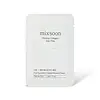What's inside
What's inside
 Key Ingredients
Key Ingredients

 Benefits
Benefits

 Concerns
Concerns

No concerns
 Ingredients Side-by-side
Ingredients Side-by-side

Water
Skin ConditioningButylene Glycol
HumectantAlcohol
AntimicrobialSodium Palmitate
CleansingSodium Stearate
CleansingXylitol
HumectantPEG-12 Dimethicone
Skin ConditioningGlycerin
HumectantBis-PEG-18 Methyl Ether Dimethyl Silane
EmollientPEG-8
HumectantSodium Citrate
BufferingDimethicone
EmollientPotassium Alginate
Emulsion StabilisingMethyl Methacrylate Crosspolymer
Parfum
MaskingPhenoxyethanol
PreservativeXanthan Gum
EmulsifyingCitric Acid
Buffering1,2-Hexanediol
Skin ConditioningCollagen Water
HumectantLaminaria Japonica Extract
Skin ProtectingMesembryanthemum Crystallinum Extract
HumectantCetraria Islandica Extract
CleansingPropanediol
SolventTocopherol
AntioxidantCI 16035
Cosmetic ColorantAloe Barbadensis Leaf Extract
EmollientBoerhavia Diffusa Root Extract
Skin ProtectingSodium Hyaluronate
HumectantSodium Soy Hydrolyzed Collagen
Hydroxypropyltrimonium Hyaluronate
Hydrolyzed Collagen
EmollientCollagen
MoisturisingCollagen Amino Acids
MoisturisingCollagen Extract
Skin ConditioningEthylhexylglycerin
Skin ConditioningSoluble Collagen
HumectantHydrolyzed Hyaluronic Acid
HumectantSodium Acetylated Hyaluronate
HumectantHyaluronic Acid
HumectantSodium Hyaluronate Crosspolymer
HumectantHydrolyzed Sodium Hyaluronate
Skin ConditioningPotassium Hyaluronate
Skin ConditioningWater, Butylene Glycol, Alcohol, Sodium Palmitate, Sodium Stearate, Xylitol, PEG-12 Dimethicone, Glycerin, Bis-PEG-18 Methyl Ether Dimethyl Silane, PEG-8, Sodium Citrate, Dimethicone, Potassium Alginate, Methyl Methacrylate Crosspolymer, Parfum, Phenoxyethanol, Xanthan Gum, Citric Acid, 1,2-Hexanediol, Collagen Water, Laminaria Japonica Extract, Mesembryanthemum Crystallinum Extract, Cetraria Islandica Extract, Propanediol, Tocopherol, CI 16035, Aloe Barbadensis Leaf Extract, Boerhavia Diffusa Root Extract, Sodium Hyaluronate, Sodium Soy Hydrolyzed Collagen, Hydroxypropyltrimonium Hyaluronate, Hydrolyzed Collagen, Collagen, Collagen Amino Acids, Collagen Extract, Ethylhexylglycerin, Soluble Collagen, Hydrolyzed Hyaluronic Acid, Sodium Acetylated Hyaluronate, Hyaluronic Acid, Sodium Hyaluronate Crosspolymer, Hydrolyzed Sodium Hyaluronate, Potassium Hyaluronate
Alternatives
Ingredients Explained
These ingredients are found in both products.
Ingredients higher up in an ingredient list are typically present in a larger amount.
Collagen is the most abundant type of structural protein found in your body. It is an effective skin moisturizer.
There is no conclusive proof that collagen is used by skin when applied topically. However, it is a great humectant that hydrates skin. Hydrated skin is associated with increased elasticity and a decrease in the appearance of wrinkles. It is also essential for maintaining a healthy skin barrier.
Biologically, collagen is responsible for keeping skin firm and youthful. Collagen is comprised mostly of glycine, proline, and hydroxypoline. These are amino acids.
Collagen will not increase sun sensitivity, but you should always wear sunscreen during the day.
Learn more about hydrolyzed collagen here.
Learn more about CollagenHyaluronic acid is naturally found in healthy skin. It is a humectant, meaning it draws moisture to your skin.
This ingredient helps hydrate, soothe, and protect the skin.
What makes hyaluronic acid so hydrating? It has the capacity to bind or hold large amounts of water.
Fun fact: It is already naturally found in our bodies, such as the fluids of our eyes and our joints.
Studies find this ingredient to have anti-inflammatory and anti-microbial properties. This can help speed up wound-healing.
Hyaluronic acid can be irritating if the molecule has a low-molecular weight, or if the molecules are small.
One study found low-molecular weight hyaluronic acid to be pro-inflammatory, meaning some people may experience irritation. This is because our bodies use hyaluronic acid in the wound-healing process to signal to our bodies, via irritation, that something needs healing.
The same study found high-molecular weight hyaluronic acid to be anti-inflammatory.
These are some other common types of Hyaluronic Acid:
Learn more about Hyaluronic AcidHydrolyzed collagen has a misleading name because it is actually a mixture of various proteins/peptides. This ingredient has skin hydrating properties.
Collagen is the most abundant type of structural protein found in your body. In your skin, it is responsible for keeping it firm and youthful.
Hydrolyzed Collagen is created by breaking up proteins into smaller peptide bonds. These peptides act as humectants and emollients.
Humectants are great at holding onto water, keeping skin hydrated. Emollients create a thin barrier on the skin to prevent moisture from escaping.
There is ongoing debate about whether hydrolyzed collagen works because it increases skin hydration. Skin hydration is also linked to elasticity and the appearance of wrinkles.
Collagen or peptide ingredients can be used in the morning or night. They will not increase sun sensitivity, but you should always wear sunscreen during the day.
According to a manufacturer, this ingredient is a great hair conditioner as well.
This ingredient can be extracted from different sources, including:
Vegan collagen is derived from yeast, bacteria, or plant sources. Vegan collagen would go by a different INCI name, such as hydrolyzed soy protein.
The results are varied.
A study from 2021 found hydrolyzed collagen increased elasticity and improved wrinkles in 1,125 participants between age 20 and 70. Another study found increased skin thickness in participants between the ages of 45 to 59.
However, It is difficult to prove that oral collagen will end up working on your skin. Many of the studies using hydrolyzed collagen also add several vitamins and nutrients into the test mixture as well.
Further studies are needed at this time.
Learn more about Hydrolyzed Collagen